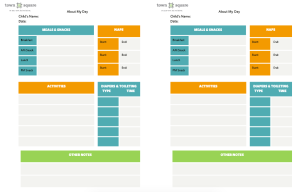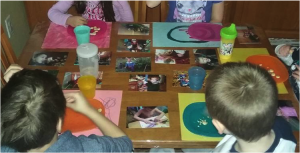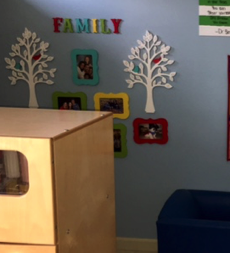Relationships with families are at the heart of an early childhood professional’s work. Building and sustaining these relationships benefits the children in your care as well as your business. Family engagement can look different for different programs– some programs plan events during the day or after hours for families to drop in, others integrate a more casual approach where families can spend time in the program as they’re available. Family engagement can also look more formal, with structured conferences or requesting volunteers for field trips. Welcoming families into your program is the first step to building strong relationships.
Give families a snap shot of their child’s day in care! Prints two sheets per page.
During our webinar, Child Development for the Family Child Care Provider, there were many providers offering excellent suggestions and strategies for helping to bridge the home and FCC experience and partnering with parents in this process. Here are a few of the highlights:
- “I find that the children in my child care home adapt to their environment with me better when I try to include things that maybe they do at home.”
- “There is a child who I cared for who used to throw very big tantrums and have huge melt downs when he did not get his way. I sat down with mom and she stated he did the same thing at home also. So we both agreed on a strategy and we both did it”.
- “Role modeling is very important. Children do what they see us do”.
- “I believe when we are supportive of families, and encourage love and give hope and encouragement and understanding, and show support for families, it helps the families to feel like someone is in their corner and they are not all alone in parenting”.
- “I offer hand-outs, give website links and short reads to my parents. I also host a parent meeting annually where just the parents are able to attend, we discuss topics, I share what I know, and we together look for answers”.
(These are quotes from FCC professionals who participated in the webinar and contributed their questions and ideas during the live webinar. We have made minor edits to some quotes to fit this format. To view the recording of the webinar, click on the Professional Development section and explore webinars).
As a family child care provider, the well-being of the parents I provide services to is just as important as the children that I care for on a daily basis. Parents would often share how overwhelmed they felt balancing work, home and family. Having raised three of my own children, I could empathize with their frustration. I thought, what would have made raising my children a little easier? This thought gave way to Parents’ Night Out.
Parents’ Night Out is an opportunity for parents to spend an evening catching up on rest without having to worry about child care. I provide this free service quarterly to the parents of children 2 -12 years old that are currently enrolled. Children are allowed to sleep over Friday night through Saturday afternoon at my family child care home. During this time parents are encouraged to go out on a date, enjoy a movie or just catch up on much needed rest and relaxation.
Children benefit from this time away from their parents as well. During the overnight stay, all activities are child-centered. They help plan the evening and morning meals, play group games, select a movie (age appropriate) to watch, and participate in free choice activities with their child care mates!
Lots of planning and prep work goes into make the evening a success for both parents and children alike. I notify parents one month in advance of the event and I stress the importance of taking time to re-energize for their child’s well-being. This is especially important for single parent households. I develop activities with the children during the week before the event to help the children transition to spending the night away from home for the first time. Children are encouraged to bring their favorite toy, pillow, sleeping bag, or blanket.
It’s been twenty years since I began offering Parents’ Night Out and I am still amazed at the impact it has on the parents. They return less stressed and eager to know how their child enjoyed the evening. For me it’s just one more opportunity to continue supporting families in their parenting endeavors and what a privilege and joy it is!
Using family photos from the children in your care is a great way to connect with families and also include culturally relevant images in your environment. These can be a source of comfort and reassurance for children throughout their day.
Diane Ott, owner of Happy Kids, added photos of children in her care to a table that is used for meals and also other activities throughout the day by placing them under a clear plastic table cover.
Sandy Cole, owner of Sandy’s Kids, has a display of family pictures on a wall near the dramatic play area. The leaves on the trees in the display have the names of all of the children Sandy has cared for over the years.
Where might you include photos of children’s families in your family child care home?
Town Square Research to Practice Statements offer information from theory and research with examples and suggestions for what it means in your work with children. This series of position statements includes topics such as fostering self-regulation, the power of open-ended materials, and the benefits of incorporating the arts.
Town Square Research to Practice Statement: Parent Engagement
Family child care provider Melody Robinson shares the following information on a tip sheet for parents when their child is ready to start learning to use the toilet. She has found that sharing this information has helped parents support their child’s success in her family child care and also when the child is at home.
Helpful Tips for Potty Training for Parents
This list of do’s and don’ts will help you and your child to be more successful at potty training. This is a new learning experience for your child, and you can make it less stressful for them by being patient. They will learn the necessary bathroom skills.
Potty Training Reminders:
No belts
No suspenders or overalls
No onesies t-shirts
No body shirts
No hard to unsnap clothing
(These items hamper the child’s success at potty training)
Potty Training Do’s
Wear only pants with elastic waist
Wear easy to lift or pull down clothing
Wear pull-ups, velcro diapers, or panties with rubber covering in case of accidents
PLEASE SEND EXTRA CLOTHING IN CASE OF ACCIDENTS
Learn, Share, and Grow series cover a particular topic over a series of short video segments. So if you only have 5 minutes, you can watch one, and if you have more time you can watch a whole series. Check out these short professional development segments on topics of interest to family child care professionals on the Professional Development page.
In our recent webinar on child development, providers had lots of questions and advice on dealing with the development of the children in their care. So we brought together some resources from providers as well as expert in the field. Check out these resources for more information.
Establishing a United Approach with Parents
The webinar on January 20, 2016 sparked conversations about common scenarios that family child care providers often face in working with families. It can be challenging to approach parents concerning their child’s behavior. Sometimes the behavior is not occurring at home, only in the family child care environment. Sometimes parents see the behavior you describe at home as well, but they aren’t sure what to do about it. It can be difficult to have a discussion with a parent about their child’s behavior not knowing how they will react. Visit the Town Square discussion board to connect with other providers and share ideas about ways to approach talking with parents.
You may have heard the expression that parents need to have a “united front” with their children. We believe family child care providers and parents need to have a united front as well. Beginning with an open conversation with a parent regarding your concerns about their child’s behavior and also lets parents know that you want to collaborate with them to provide consistent messages and responses to children is the starting point.
Try to set the parent at ease and let them know you would like their help to develop a plan to address the issue. Parents may feel embarrassed or upset about the behavior, so reassure them that you will find a solution together. Your years of experience and knowledge of children can further reassure parents. Your experience counts for a lot and you can always seek further resources and help.
When collaborating with parents, each person needs to feel good about and comfortable with the plan. The benefit of collaborating with parents is the consistency for their child. Children feel more secure when they are getting the same message of expected behavior instead of mixed messages. Set goals together for the child and a time to talk again and assess the plan and the child’s progress, and make adjustments and changes to the plan as needed.
To view the Child Development for the Family Child Care Provider webinar visit the Grow page on Town Square.







